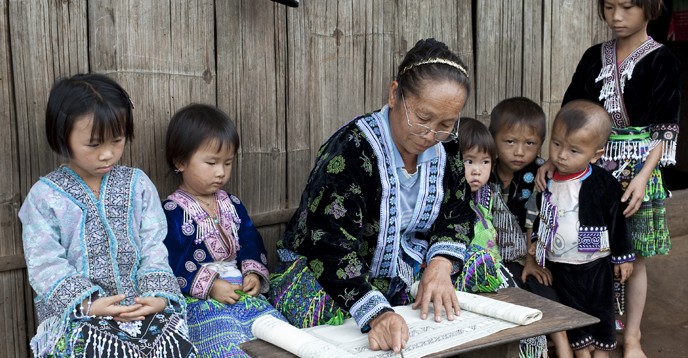International Day of the World's indigenous peoples

By resolution 49/214 of 23 December 1994, the United Nations General Assembly decided that the International Day of the World's Indigenous Peoples shall be observed on 9 August every year. The date marks the day of the first meeting, in 1982, of the UN Working Group on Indigenous Populations of the Sub-Commission on the Promotion and Protection of Human Rights. In 1990, the UN General Assembly proclaimed 1993 the International Year of the World's Indigenous Peoples (A/RES/45/164 A/RES/47/75)
Each year, UNESCO marks the celebration of the Day by sharing information on projects and activities that are relevant to the annual theme.
Indigenous peoples live in all regions of the world and own, occupy or use some 22% of global land area. Numbering at least 370-500 million, indigenous peoples represent the greater part of the world’s cultural diversity, and have created and speak the major share of the world’s almost 7000 languages. Many indigenous peoples continue to be confronted with marginalization, extreme poverty and other human rights violations. Through partnerships with indigenous peoples, UNESCO seeks to support them in addressing the multiple challenges they face, while acknowledging their significant role in sustaining the diversity of the world’s cultural and biological landscape.
MESSAGE FROM THE DIRECTOR-GENERAL
"Indigenous peoples are now increasingly exposed to forced migrations, which are often the result of environmental disasters or social and political conflicts. Driven from their territories, they see their lifestyles and cultures disintegrate and vanish, often without any prospect of returning. [...] On this International Day, we reaffirm our full commitment to the United Nations Declaration on the Rights of Indigenous Peoples, adopted in 2007, and we call on the international community to mobilize to ensure the full respect of indigenous peoples' dignity, well-being and fundamental freedoms."
— Audrey Azoulay, Director General, Message on the occasion of the International Day of the World's Indigenous Peoples
Download the complete message in PDF format
English | Français | Español | Русский | العربية | 中文
WHAT UNESCO DOES FOR THE INDIGENOUS PEOPLES
UNESCO has broad mandates in the fields of education, natural sciences, social and human sciences, culture, and communication and information. Its policies, programmes and projects provide opportunities and have significant impacts (positive and negative) for indigenous peoples worldwide.
The 2030 Agenda commitment to ‘Leave no one behind’ brings new impetus to ensure that indigenous peoples’ priorities are heard. Following the adoption of the UN Declaration on the Rights of Indigenous Peoples by the UN General Assembly in September 2007, and the UN Development Group (UNDG) Guidelines on Indigenous Peoples’ Issues issued in 2008, it is increasingly important that UN agencies, including UNESCO, consider how to provide guidance on engaging with indigenous peoples. In this light, the UNESCO policy on Engaging with Indigenous Peoples seeks to outline a house-wide approach that will guide all of UNESCO’s programme sectors in their interactions with indigenous peoples and their organizations.
RESOURCES
- Resolution adopted by the General Assembly
- UN website about this day
- All Commemorations
- Previous commemorations : 2018 - 2017 - 2016 - 2015 - 2014





